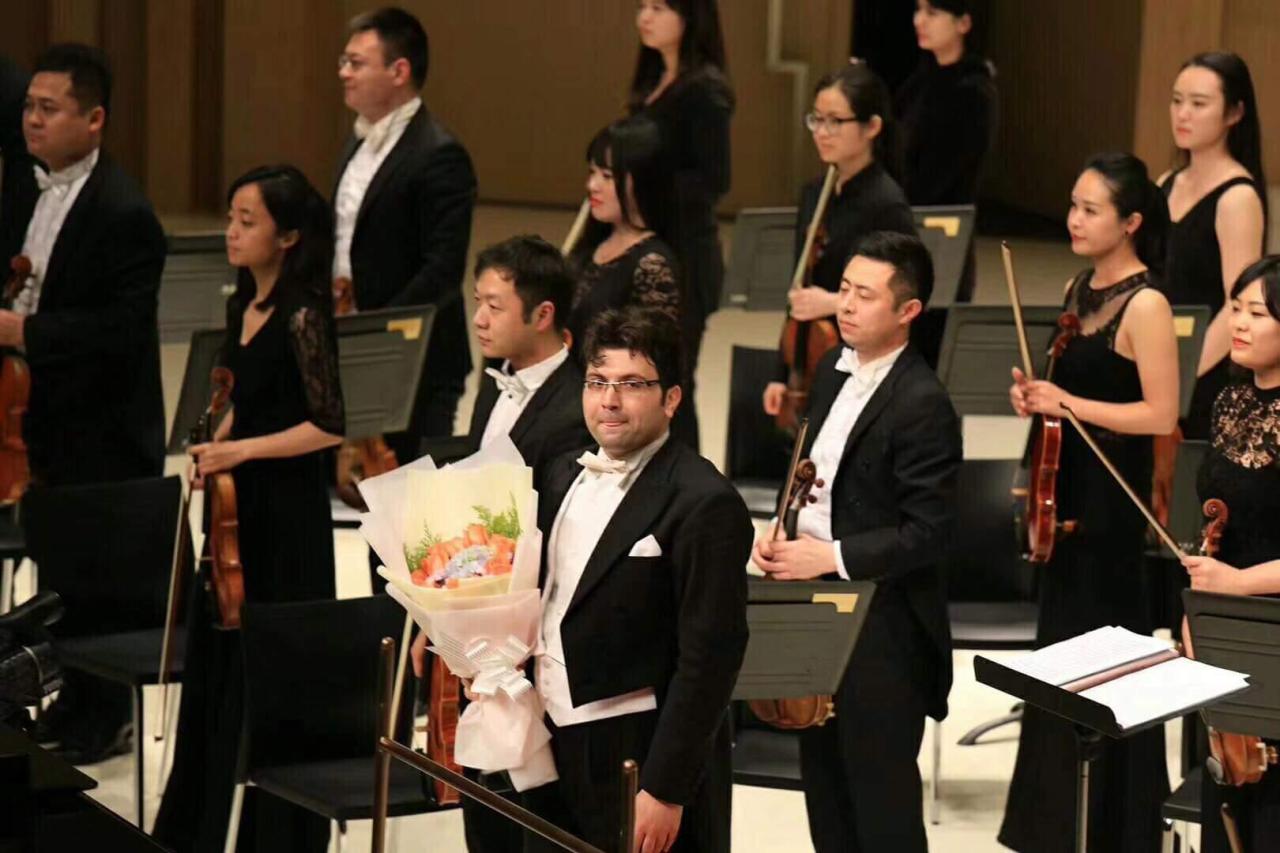Azerbaijani musicians got a round of applause in China [PHOTO]
![Azerbaijani musicians got a round of applause in China [PHOTO]](https://www.azernews.az/media/2018/06/29/yunnan1.jpg)
By Laman Ismayilova
Yunnan Grand Theater in China hosted a gala concert timed to the 100th anniversary of the Azerbaijani Democratic Republic and the 100th jubilee of an outstanding composer Gara Garayev.
The concert was attended by the Kunming International Philharmonic Philharmonic under the baton of Honored Artist of Azerbaijan, conductor of the State Academic Opera and Ballet Theater, Eyyub Guliyev, and famous soloists from Azerbaijan and Belarus, Trend Life reported.
The concert was organized with the support of the Azerbaijani Embassy in China and the Kunming Culture Institute.
The official part of the event was made by the Azerbaijani Ambassador to China Akram Zeynalli. It was noted that the concert of the Azerbaijani conductor and the famous Chinese symphony orchestra once again testifies to the close friendly ties between the cultural figures of the two countries.
The great symphonic works of Azerbaijan and China sounded at the concert. An overture to the opera "Koroglu" by Uzeyir Hajibeyli, symphonic engravings "Don Quixote", excerpts from the ballet "Seven Beauties" and "Path of Thunder" by Gara Garayev "Azerbaijan Capriccio" by Fikret Amirov , "Torch Festival" by Wang Xilin and "Ode" Liu Kuming sounded at the concert.
Alex Shasholko (Belarus) and violinist Samir Asadov thrilled the audience.
On May 28, 1918, Azerbaijan declared its independence establishing the Azerbaijan Democratic Republic, which became the first secular parliamentary democracy in the Muslim World and recognized by other democratic nations, including the United States of America.
During the short period of independence Azerbaijan granted all people the rights to vote regardless of race, gender, ethnicity, and religion, becoming the first Muslim nation to give women equal political rights with men, an accomplishment preceding the United States. Azerbaijan’s independence was interrupted in 1920, when it was invaded by Bolshevists, and forcefully incorporated into the USSR in 1922 to restore its independence only in 1991.
Having synthesized Eastern and Western musical traditions, his works cover essentially all genres. The works by Gara Garayev are performed all over the world.
Garayev inherited his love of music from his parents. His father Ebulfaz Garayev was a famous pediatrician in Baku. Ebulfaz Garayev was known for his kindness and generosity. When patients were too poor to pay for treatment, he often left money under the prescription that he had written out for them.
He knew Azerbaijani folk music very well and loved to sing. Garayev's mother, Sona Khanim, was among the first graduates of the Music School, the Baku branch of the Russian Music Society.
At the age of eight, Garayev first entered the junior music school at the Azerbaijan State Conservatoire. His exceptional musical talents let him to study simultaneously in two faculties at the conservatoire. His teachers were Georgi Sharoyev, Leonid Rudolf, and the prominent Azerbaijani composer Uzeyir Hajibeyli.
In 1938, Garayev composed his first musical piece, a cantata "The Song of the Heart" to the poem by Rasul Rza. It was performed in Moscow's Bolshoi Theater in the same year. He was only 20 years old at the time.
Garayev returned to Baku in 1941. He began teaching students at Azerbaijan State Philharmonic Society.
In 1945, both he and Jovdat Hajiyev wrote the "Motherland" opera, for which they were awarded a prestigious Stalin Prize. At the age of 30, Garayev was again awarded this prize for his symphonic poem "Leyli and Majnun", based on the same-titled famous work of Nizami Ganjavi.
In 1952, under the direction of the choreographer P. A. Gusev, Garayev's "Seven Beauties" ballet was staged at the Azerbaijani Theater of Opera and Ballet. Based on Nizami Ganjavi's famous poem, "Seven Beauties", it became the first Azerbaijani ballet and opened a new chapter in the history of classical music of Azerbaijan.
His ballet, "Path of Thunder", staged in 1958, was dedicated to racial conflicts in South Africa. In the same year, he wrote the score for the documentary film" A Story About the Oil Workers of the Caspian Sea", directed by Roman Karmen and set at the Oil Rocks.
Through his life, Garayev wrote nearly 110 musical pieces, including ballets, operas, symphonic and chamber pieces, solos for piano, cantatas, songs and marches, and rose to prominence not only in Azerbaijan, but also worldwide.
He brilliantly juxtaposed features of Mugham with jazz, blues, African music, European counterpoint styles, and developments related to the 20th century Western music such as the 12-tone technique.
Garayev died on May 13, 1982 in Moscow at the age of 64.
The composer leaved behind a legacy of music that will be felt for generations to come. The memory of great composer will always live in the hearts of Azerbaijani people.
---
Laman Ismayilova is AzerNews’ staff journalist, follow her on Twitter: @Lam_Ismayilova
Follow us on Twitter @AzerNewsAz
Here we are to serve you with news right now. It does not cost much, but worth your attention.
Choose to support open, independent, quality journalism and subscribe on a monthly basis.
By subscribing to our online newspaper, you can have full digital access to all news, analysis, and much more.
You can also follow AzerNEWS on Twitter @AzerNewsAz or Facebook @AzerNewsNewspaper
Thank you!

